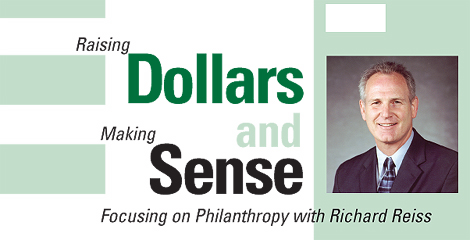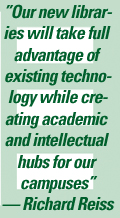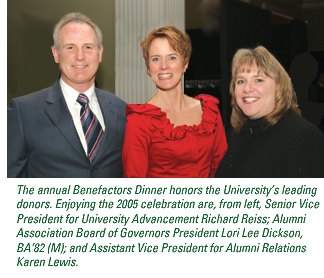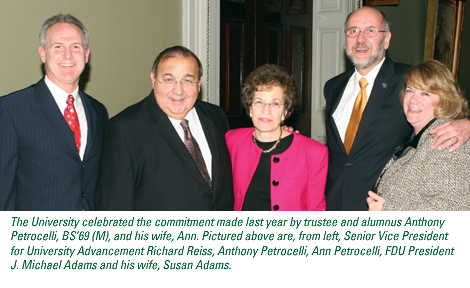


niversity graduates expect that yearly phone call from their alma mater asking for a donation. But there is far more to university fund raising than the calls. Senior Vice President for University Advancement Richard Reiss, charged with revitalizing philanthropy and the efforts of the development team, has begun to transform the University’s giving programs with impressive results. In the last two years, commitments to the University have more than doubled. Reiss gave FDU Magazine a candid look inside the University’s fund-raising efforts.

How has the face of philanthropy changed at Fairleigh Dickinson University in recent years?Clearly, the number of donors and dollars has increased significantly, but philanthropy is so much more than that. It creates an environment where people feel empowered to effect change. I think that our donors are beginning to realize that they can have a tremendous impact at the University. Look at what John [BS’65 (M)] and Joan Monninger did. They donated $1 million to jumpstart a campaign to renovate and rebuild the University’s five libraries.
It’s wonderful that the University is getting major donors to support its mission, but do we lose sight of the vast majority of our alumni by only focusing on the big gifts?
It was the University’s first million-dollar gift in more than 10 years. That gift set a new benchmark for other donors wanting to make a difference. In the year since the Monninger gift, the University has received two more multi-million-dollar commitments. Simultaneously, gifts to the Fund for FDU — the unrestricted gifts to the University — rose by nearly 30 percent. It’s a new era of giving at FDU. Our donors recognize that philanthropy has the power to transform, and I am proud to say that nearly 8,000 donors are helping to transform the University.
For the last two years, we have absolutely focused on cultivating and securing major gifts from individuals, corporations and foundations. As a result, the number of donors to the University who made gifts of $25,000 or more increased from six to 25 in the last year alone. It was a short-term strategic decision made to reinvigorate the University’s giving programs. We will never abandon our strategic approach to securing major gifts, but we have since redoubled our efforts to reposition the Fund for FDU so that more alumni will give.
The Fund for FDU must be a strong base for giving. If we don’t have the money to pay the faculty and staff, to keep the lights on and to develop centers of excellence, then we can’t support the bigger donations that do things like build libraries. We are going to be reaching out to alumni in new and different ways, taking full advantage of the Internet. We want all alumni to know that a donation to the Fund for FDU, no matter what size, is critical to the future of the University.
Tell us a little bit about your team.I was very fortunate to come into an organization with some outstanding fund-raising professionals. Unfortunately, the structure of the Office of University Advancement was, in my view, not very efficient from an operational standpoint. Nearly everyone had multiple responsibilities that prevented them from focusing on the major task at hand, which was to raise money for the University.
Today, our fund-raisers are fund-raisers. We’ve added a stewardship and events manager, a director of operations, a campaign director and a second person focusing on corporate and foundation giving. We created the position of executive director of development so that I can spend more time with donors and less time managing the office. We also completely overhauled the Office of Alumni Relations so that its objectives are aligned with our development objectives. It’s been very gratifying to see everything fall into place and to know that the changes we made are working.
Are there other ways for alumni to become meaningfully involved in the life of the University?
I think there are many ways for alumni to become involved. Nonetheless, it would be disingenuous of me to say that I personally wanted anything other than that involvement to lead to giving. Philanthropy is about passion. I believe involvement with the University makes one passionate about what we do and hopefully will lead to a gift.

Of course, not everyone will be a donor, and I respect that decision whatever the reason. However, that doesn’t mean I will stop trying. Alumni participate in career panels with students, networking nights, student recruitment and orientation and serve as guest lecturers and members of many different advisory boards throughout the University. The opportunities really are limitless for any graduate who wants to become involved.
What has been the biggest challenge so far?
Without a doubt it has been trying to raise the level of alumni participation in giving. About 6 percent of our alumni are donors to the University. That’s quite low, particularly for a private University. We have greatly increased the number of alumni visits made by our staff each year, and that has helped somewhat. Also, attendance at alumni events continues to rise, and hopefully that will translate to more donors. My hope is that we will begin to do some clever and creative marketing to get our message across.
You mentioned a campaign for the University’s libraries. Tell us about that.
The University has five libraries: Two main libraries — one at the College at Florham and one on the Metropolitan Campus; a library at Wroxton College (FDU’s campus in England); and a business library and a library in Edward Williams Hall on the Metropolitan Campus. The main libraries have not had any significant renovations since they were built more than 40 years ago. On the Metropolitan Campus, the building is structurally sound, but it needs significant changes to the infrastructure. At the College at Florham, we hope to construct a completely new building. We have had many architects go through the building and suggest exciting designs. However, a contemporary library is much more than thousands of books and journals. Our new libraries will take full advantage of existing technology while creating academic and intellectual hubs for our campuses — true 24/7 gathering places for learning and discourse.
Fund raising is a lot like sales. What sells at FDU?
The people I talk to are very excited about FDU’s global mission. They recognize that in today’s world students who have a global understanding and perspective are more apt to be successful. They like that we continue to be a leader in this area of higher education and that other universities are emulating what we began here. It’s a great point of pride.
We are also very fortunate to have a president like J. Michael Adams, who is not only passionate about the University, but is truly visionary. It makes my job a lot easier when the president can get the alumni excited about the University’s mission and vision for the future.
Ultimately, I think our donors want to know that their gifts have impact. That might be a scholarship, a grant for faculty research or support for our athletic programs. Everyone is motivated differently. The challenge for those of us in development is to figure out what the motivators are.

Look at what the late Anthony Petrocelli, BS’69 (M), did: He and his wife, Ann, made a $4 million commitment dedicated to improving the New College of General and Continuing Studies, which is now named the Anthony J. Petrocelli College of Continuing Studies. Why did they give to this college? Because Tony was a nontraditional student — he attended FDU’s Madison Campus at night while working at Allied. He was a successful entrepreneur who had great success with leveraged business buyouts. He gave to the college because the majority of FDU’s nontraditional students can be found there. He was not just a wonderful success story, but in many ways he epitomized an important core FDU value — our commitment to provide opportunities to any student capable of succeeding in a university environment.
I could share dozens of touching FDU stories about why people give to the University, and I am sure there are hundreds more of which I’m unaware. A few months ago, a woman came into my office with a check for $25,000. Her name was Dorothy Rudy, and her husband, Willis, who had recently passed away, was a long-time faculty member at the University. The check was to endow a scholarship in his name. She was a delightful woman who told me wonderful stories about her husband. She was thrilled to be able to make a gift of this magnitude in memory of him, and I was delighted to be able to accept the gift on behalf of Fairleigh Dickinson University. It was a joyful gift in every sense of the word.
We have heard it said that you do not believe in “friend raising” with donors. Yet, isn’t that integral in building the type of trust that is necessary for a major gift?
Would you ever ask a friend for a million dollars? I don’t think I would. What I encourage the fund-raisers to do is to create meaningful professional relationships with the University’s donors and prospects. The fund-raiser is often the catalyst and the conduit, but ultimately the relationship is between the donor and the University. I never want a personal relationship between a fund-raiser and a donor to supersede the relationship between a donor and the University. I expect good, positive, professional relationships, but not friendships.
Besides the Campaign for the Libraries of FDU, what else is on the horizon?
We plan to roll the library campaign into a much larger comprehensive effort focused on building the University’s endowment, creating new scholarships, supporting athletics and renovating classrooms and buildings. In addition, we will seek greater philanthropic support for those programs and initiatives that are important to strengthening our global mission.
You obviously like what you do. What motivates you?
Most people think that receiving a donation is a wonderful experience for the recipient. What gives me the greatest pleasure, however, is ensuring that a donation is a joyful experience for the donor. I want donors to this University, regardless of the size of the gift, to feel good about their giving and to know that they have made the right philanthropic choice. Knowing that I have helped to create a joyful gift that will have tremendous impact is a great motivator for me.
FDU Magazine Home | Table of Contents | FDU Home | Alumni Home | Comments
©Copyright 2006 Fairleigh Dickinson University. All rights reserved.
For a print copy of FDU Magazine, featuring this and other stories, contact Rebecca Maxon, editor,
201-692-7024 or maxon@fdu.edu.